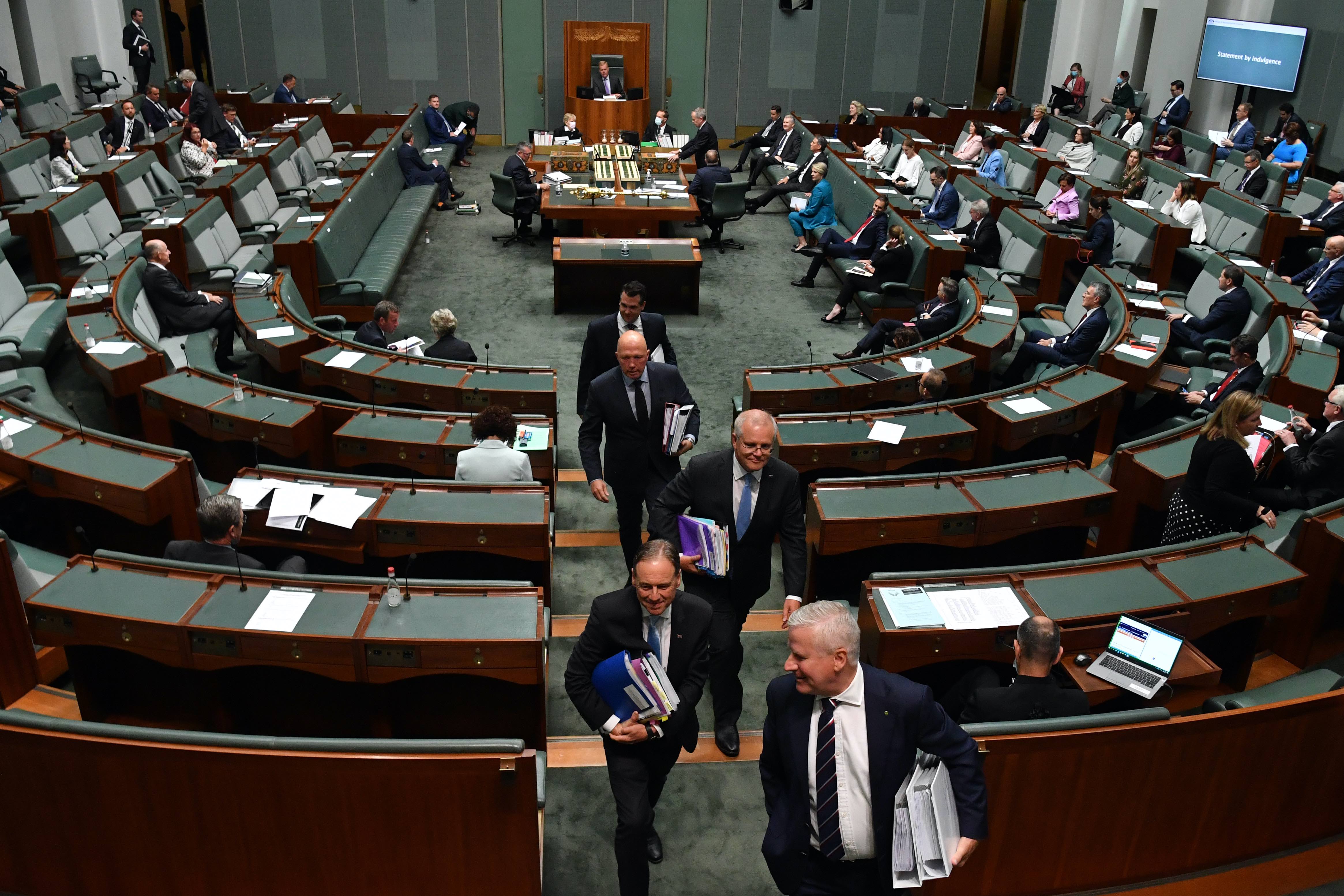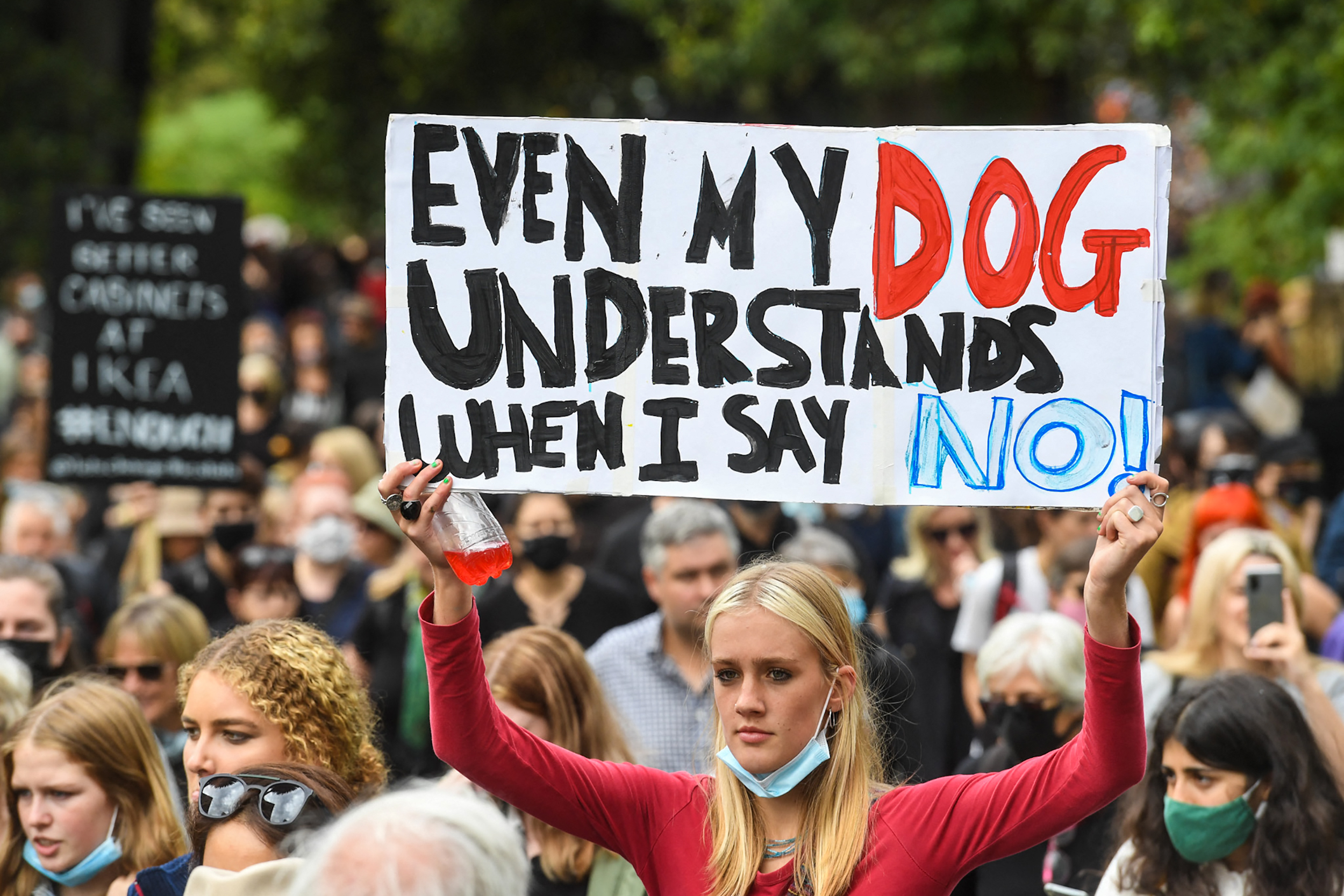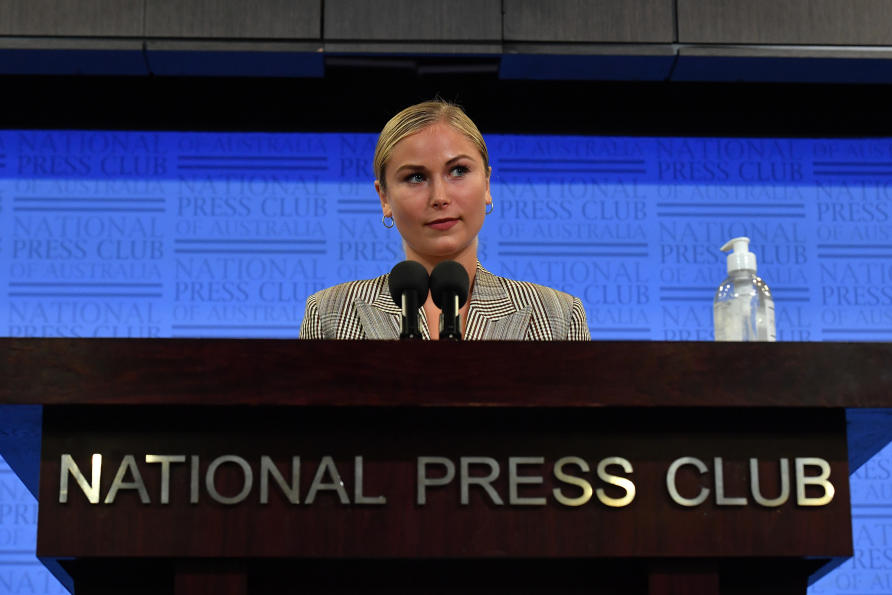
Politics & Society
Allegations of sexual harassment and abuse an urgent test for government

The second year of the COVID-19 pandemic had a tangible impact on global democracy – but what is 2022 likely to have in store for us?
Published 6 January 2022
The second year of the global pandemic was a tumultuous one for Australia’s government.
Australian women marched for justice following allegations of rape, sexual harassment, discrimination and sexism in the nation’s Parliament House.

Climate change also dominated politics, with Scott Morrison committing to net zero emissions by 2050 at COP-26.
But we also saw diplomatic rows, resignations and all sides of Australian politics gearing up for a looming election in 2022.
Internationally, 2021 began with democracy taking a blow as rioters stormed the US Capitol Hill building following Donald Trump’s election defeat to Joe Biden.

Politics & Society
Allegations of sexual harassment and abuse an urgent test for government
So what do we now know about politics after the events of 2021? And what is 2022 likely to have in store?
We asked three University of Melbourne experts for their take on 2021. Dr Clayton Chin is a Senior Lecturer in Political Theory in the School of Social and Political Sciences; Jenny Macklin is a Vice-Chancellor’s Fellow in the Melbourne School of Government; and Associate Professor Tom Daly is the Deputy Director of the Melbourne School of Government.
There are deep ideological divisions separating members of contemporary Western liberal democracies.
On the one hand, this is common sense, but these divisions aren’t only around the economy, the role of religion, or identity politics. With the rise and persistence of anti-lockdown, anti-mask and anti-vaccination protests, the COVID-19 pandemic has exposed fundamental divisions over the identity of Western political communities.

In December, ‘freedom’ protestors converged on the rural Victorian town of Ballarat to ‘reclaim’ the Eureka flag famously flown at the Battle of the Eureka Stockade which ended the rebellion.
It is now a symbol often identified with the growth of democratic enfranchisement in Australia and of the power of political disobedience.
Protests like this around the world have consistently drawn on the language of individual freedom and personal choice to justify opposition to vaccines, masks and lockdown restrictions.

Politics & Society
The battle for the racial future of America
The latter are construed as government overreach or seen as states oppressively mandating what goes into and onto our bodies, or viewed as a fundamental restriction on freedom to move and associate.
These claims can be confusing for other citizens who see vaccines and restrictions as simply governments performing their necessary function of pursuing collective action in order to ward off a public health crisis and protect the political community.
In this way, the unique nature of the pandemic crisis has exposed a fundamental difference in how contemporary citizens see the political community and the state.
Unlike climate change, which is a slow-burning crisis building year-on-year, the pandemic is fast moving with immediate visible consequences, often close to home.
But unlike other fast crises (like a recession), it imposed visible and obvious changes on the everyday lives of all citizens in the forms of lockdowns, mask wearing and vaccination.

It required a high level of compliance with the state and for citizens to embrace state-led collective action on a problem. However, doing this requires some level of identity with the state and a feeling of belonging to the political community it represents.
But the current tensions around science, personal responsibility, public good and state action that have plagued climate change politics are the same.
In this way, the pandemic exposes the battles to come as those opposed to collective action directed by states employ the language of choice and individual freedom to avoid participating in the social costs of addressing deep crises.

Politics & Society
Australia’s Gen Y democracy gap
It also exposes that large sectors of western liberal democracy have been so individualistic and/or suspicious of the state that they don’t feel any level of belonging.
In 2021, the rage against the mistreatment of women, embodied by the March4Justice protests, finally broke through in Australia as a real political force.
And there’s no going back.
Women across all walks of life in Australia are enraged. They have lost patience at being treated with violence and abuse – a woman is murdered by a partner or former partner every week.

Women are now looking for leadership from all political parties that the issue is going to be taken seriously.
This force for change has been led by two young women survivors being prepared to speak up. Grace Tame as Australian of the Year has been extraordinary in bringing this issue to the fore and Brittany Higgins has done the same in focusing attention on the terrible behaviour that has been tolerated in the parliament.
Most importantly however the willingness of these women and others like them to speak out has led to a blue print for action to reform the parliament.

Politics & Society
Protecting staff at parliament house
Sex discrimination Commissioner Kate Jenkins’ excellent review into parliamentary workplaces includes a range of critical recommendations, including the establishment of an Office of Parliamentarian Staff and Culture to provide up to date human resources support, the introduction of a Code of Conduct, and the creation of an Independent Parliamentary Standards Commission to not only respond to complaints of bullying, harassment and sexual assault, but to also enforce the code and recommend sanctions.
In our book Enough is Enough, Kate Thwaites and I emphasised that the problem can’t be tackled unless men are held to account, and Jenkins’ report shows how this can be done.
When someone is found to be a harasser or an abuser there must be consequences – they can’t just be allowed to get away with it.

Jenkins has also recommended that targets be set for achieving gender parity among parliamentarians. This will be enormously important in driving real change but it will need conscious effort because it won’t happen on its own.
When I entered parliament as a Labor MP in 1996 there were only four women on our side in the House of Representatives. Now Labor is approaching parity with 46.3 percent women in the Federal Parliament compared with only 22.9 percent for the Liberals.
But this sort of structural change has only happened because Labor women were prepared to fight for the successful adoption by the ALP of quotas in the 1990s – plenty of men within the party would have preferred that hadn’t happened.

Politics & Society
Sexism, women and Australian politics
Even then it has taken 30 years to get to where we are now. But this is the sort of direct action that is needed.
2021 revealed, by turns, the fragility, distortions, and resilience of democracy in Australia and worldwide, with the pandemic continuing to act as both mirror and catalyst.
Protests in Melbourne against vaccine mandates and Victoria’s emergency powers Pandemic Bill laid bare the dire state of our information environment, with a mixture of conspiracy theories and misinformation concerning lockdown, vaccines and the nature of the Bill, as well as violent imagery, mirroring similar dynamics in democracies across the globe.

It has highlighted the role of social media like Facebook and YouTube as “behaviour modification empires” – we can see the results on our streets, but we still have no idea how to tackle this central problem.
Media magnification of what are ultimately fringe movements has overshadowed very real concerns.
Critics of Victoria’s Bill, for instance, have called for more parliamentary scrutiny and strengthening protest rights. With acute concerns worldwide about the normalisation or expansion of COVID-19 emergency powers, getting this democratic balance right really matters.

Politics & Society
Australia needs a democracy fix
More positively, the evidence tells us that in Australia the overwhelming majority of the public hasn’t fallen down the conspiracy rabbit hole: by mid-December 89.5 per cent of Australians aged 16 and over had received their second dose – an extremely high rate by international standards.
We are still trying to pin down what this tells us about Australian democracy compared to vaccine hesitancy (as we’ve seen in Germany) when it comes to trust in government, community solidarity or possibly quiescence to authority.
At the extreme, the extraordinary support for Western Australia’s Premier Mark McGowan’s hardline COVID-19 response provides a window into democracy without a viable opposition – an issue also raised in Japan’s October elections.
The year has closed with the Biden administration’s landmark international Summit for Democracy on 9-10 December focused on confronting authoritarianism, corruption, and human rights.

Just 11 months after the 6 January assault on the Capitol, the USA’s unresolved domestic challenges have loomed large, as have coups and takeovers in Myanmar and Tunisia, and ongoing crisis everywhere from Poland to India.
We are reminded that democracy’s problems cannot simply be blamed on hostile foreign powers. They are a generational challenge requiring serious and sustained leadership.
That leadership can seem in short supply. But, dig a little deeper, and you see leadership all around us as politicians and civil society leaders have responded to COVID challenges with creativity, including at the local level.
Which brings us to Australia’s federal elections in 2022. While we pore over polls and politicking, that fundamental question of sincere, far-sighted, big-picture leadership cannot be escaped. From integrity to the climate crisis, from the Voice to Parliament to intergenerational justice, easy fixes or piecemeal policy simply won’t cut it if Australia’s pressing challenges are to be met.
And Australians deserve nothing less.
Banner: Getty Images